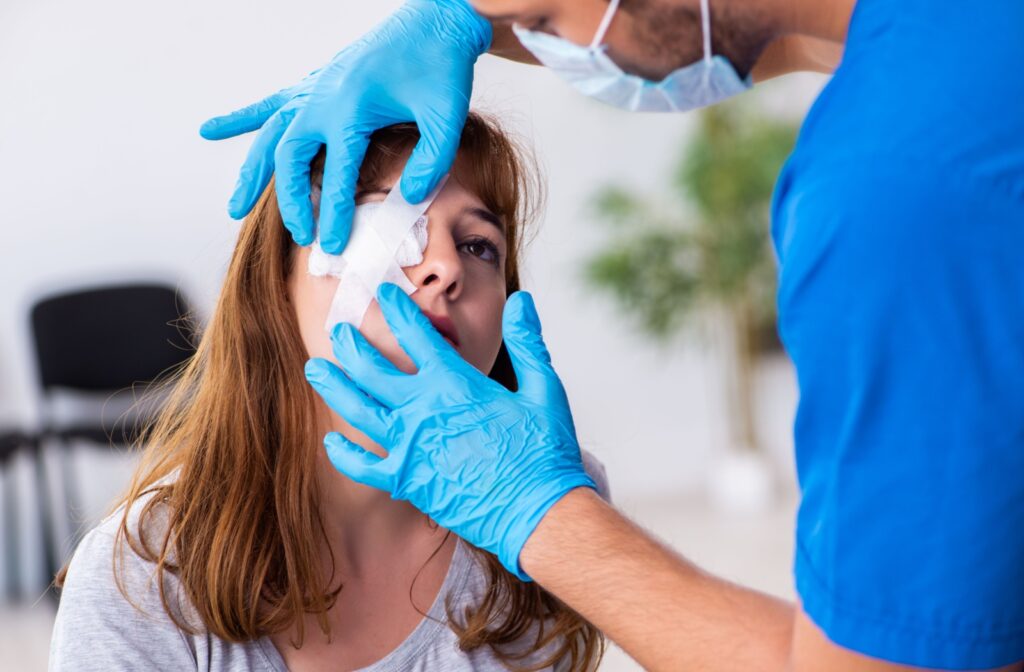If you experience an eye emergency, it is important to seek immediate medical attention. In most cases, your first instinct may be to go to the nearest hospital emergency room. However, there are other options available that may be more appropriate for your particular situation.
For an eye emergency, consider visiting an ophthalmologist or an optometrist as they specialize in eye care and are equipped to handle most eye emergencies. If it’s after hours or you cannot get an immediate appointment, the nearest hospital emergency room or an urgent care center equipped to handle eye emergencies are viable options. Quick action can be crucial in preserving vision.
Signs of an Eye Emergency
An eye emergency is any condition that causes sudden vision changes or loss, severe pain, or trauma to the eye. Some common signs of an eye emergency include:
- Sudden loss of vision: which can occur without warning and affect one or both eyes.
- Blurred or distorted vision: making it difficult to see details clearly.
- Double vision: where you see two images of a single object.
- Light sensitivity: experiencing discomfort or pain in bright light or glare.
- Severe eye pain: an intense, sharp, or throbbing ache.
- Foreign object stuck in the eye: causing discomfort or potential injury.
- Chemical exposure to the eye: leading to irritation, burning, or damage.
- Eye trauma or injury: from physical impact or abrasion to the eye area.
If you experience any of these symptoms, seek immediate medical attention.

What to Do in an Eye Emergency
In the event of an eye emergency, it’s important to remain calm and take appropriate action. Here are some steps you can take:
- Do not rub your eyes as this can cause further damage. Rubbing your eyes can exacerbate any existing injuries or irritations, potentially leading to more serious issues.
- If there is a foreign object in your eye, do not try to remove it on your own. Leave it to a medical professional. Attempting to remove the object yourself could result in scratches to the cornea or other complications.
- If you have suffered an injury or trauma to the eye, gently place a cold compress or ice pack on the affected area to reduce swelling and pain. The cold helps to constrict blood vessels, which can minimize inflammation and alleviate discomfort.
- In the case of chemical exposure, flush your eyes with clean water for at least 20 minutes. Ensuring the water runs away from your nose to avoid contaminating the other eye. If the eye is still irritated or painful after flushing, seek medical attention immediately to prevent further damage.
- If you wear contact lenses, remove them immediately and do not put them back in until you have been seen by a doctor. Keeping contact lenses in can trap harmful substances or bacteria against your eye, delaying healing or leading to infection.
- Seek immediate medical attention from an eye specialist or emergency room. Prompt professional evaluation and treatment are crucial to prevent long-term damage to your vision.
Prevention Tips
While it’s true that some eye emergencies are out of our control, taking proactive steps can significantly lower your risk of experiencing one. Here are detailed measures you can adopt:
- Always wear appropriate eye protection during activities that pose a risk of eye injury. This includes sports like squash or basketball, as well as home improvement projects that involve cutting, sanding, or anything that might send debris flying.
- Adhere to proper safety protocols when handling chemicals, such as cleaning products or laboratory substances. Wear protective eyewear to shield your eyes from harmful exposure.
- Resist the urge to rub your eyes excessively. This is particularly important for those with allergies or eye irritation, as rubbing can exacerbate the problem and even lead to injury.
- Visit your eye doctor regularly. These routine exams are crucial not just for vision correction, but also for early detection and management of potential eye conditions that could lead to emergencies if left unchecked.
- Maintain good hygiene practices if you wear contact lenses. This includes washing your hands before handling lenses, following the recommended lens replacement schedules, and avoiding overnight wear to prevent infections or complications.
- Exercise extra caution when using or being near sharp objects. Activities such as cooking, crafting, or any task involving knives, scissors, or needles should be done with awareness of your eye safety.
- Maintain access to a first aid kit that includes an eye wash solution in multiple locations—your home, workplace, and car. This ensures you’re prepared to flush out your eyes in case of exposure to chemicals or foreign objects.
Emergency Eye Care & Comprehensive Services at Total Vision Talega
It is important to know how to handle common eye emergencies such as foreign objects in the eye, cuts or scratches, and chemical exposure. By following the steps outlined in this guide, you can effectively address these situations and reduce potential damage to your eyes.
Total Vision Talega offers comprehensive eye care services and emergency care for all types of eye injuries. Don’t hesitate to reach out to our team if you experience any eye emergencies or have concerns about your eye health.



